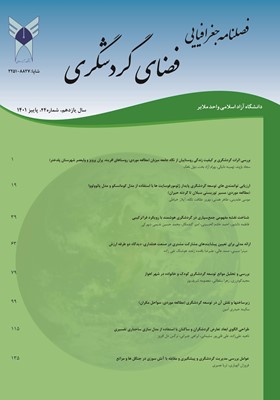بررسی و تحلیل موانع توسعه گردشگری کودک و خانواده در شهر اهواز
محورهای موضوعی : مربوط به گردشگری
مجید گودرزی
1
*
![]() ,
زهرا سلطانی
2
,
زهرا سلطانی
2
![]() ,
معصومه شریف پور
3
,
معصومه شریف پور
3
1 - دانشیار جغرافیا و برنامه ریزی شهری، دانشگاه شهید چمران اهواز، اهواز، ایران
2 - استادیار جغرافیا و برنامه ریزی روستایی، دانشگاه شهید چمران اهواز، اهواز، ایران
3 - کارشناسی ارشد جغرافیا و برنامه ریزی شهری، واحد اهواز، دانشگاه آزاد اسلامی ، اهواز، ایران
کلید واژه: توسعه, مطلوبیت فضای شهری, گردشگری کودک و خانواده, کلانشهر اهواز,
چکیده مقاله :
اهمیت نگرش به بُعد گردشگری کودک و خانواده به این جهت است که با آرمانهای بنیادین و اصول اخلاقی که زیربنای رشد و توسعه سیستم گردشگری جمعی مدرن است و گردشگری را بهعنوان یک فعالیت مصرف مثبت در جوامع مدرن متمایز میکند، ارتباط دارد. تحلیلگران گردشگری اجتماعی بر نابرابری ساختاری مختلف دسترسی به فرصتها برای سفر تأکید کردهاند که بهطور سنتی توسط تحقیقات گردشگری نادیده گرفتهشدهاند و مفهوم حقوق شهروندی برای گردشگری و برجسته کردن نقش آن در مقابله با طرد اجتماعی را موردتوجه قرار دادهاند. به همین منظور پژوهش حاضر با هدف بررسی و تحلیل موانع توسعه گردشگری کودک و خانواده در شهر اهواز تدوین شده است. رویکرد حاکم بر این پژوهش، کاربردی- نظری و روش تحقیق آن، توصیفی- تحلیلی و پیمایشی است. نتایج پژوهش نشان می دهد که ابعاد مدیریتی، اجتماعی- فرهنگی، امنیتی، تکنولوژیکی و زیستمحیطی به ترتیب دارای بیشترین سهم در نامطلوبیت فضای شهری اهواز در توسعه گردشگری کودک و خانواده است. همچنین در بررسی اهمیت عوامل، عامل اجتماعی- فرهنگی با ضریب (371/0) دارای بیشترین اهمیت و عامل زیستمحیطی با ضریب (021/0-) دارای کمترین اهمیت در بین عوامل توسعه گردشگری کودک و خانواده در کلانشهر اهواز میباشد.
The significance of the attitude towards child and family tourism is due to the fact that it is associated with the fundamental therapies and ethical principles that underlie the growth and development of the modern collective tourism system and distinguishes tourism as a positive consumption activity in modern societies. Social tourism analysts have cited various structural inequalities in access to travel opportunities that have traditionally been overlooked by tourism researchers, highlighting the concept of "citizenship rights" for tourism and highlighting its role in tackling social exclusion. For this purpose, the present study aims to investigate and analyze the barriers to development of child and family tourism in Ahvaz. The general approach of this research is descriptive-analytical and survey. The results show that managerial dimensions، socio-cultural security technological and environmental dimensions respectively have the greatest contribution to the urban space undesirability of Ahvaz in the development of child and family tourism. Also, in the factor analysis it was shown that the "socio - cultural" factor with the coefficient of 0.371 was the most significant one while the environmental factor with the coefficient of -0.021 was the least significant one among the factors of child and family tourism development in Ahvaz metropolis.
World Tourism Organization (UNWTO). 2014. A Specialized Agency of the United Nations, International Forum on Sustainable Development of Tourism and Innovation Cartagena de Indias, Colombia, 24 June.
_||_
